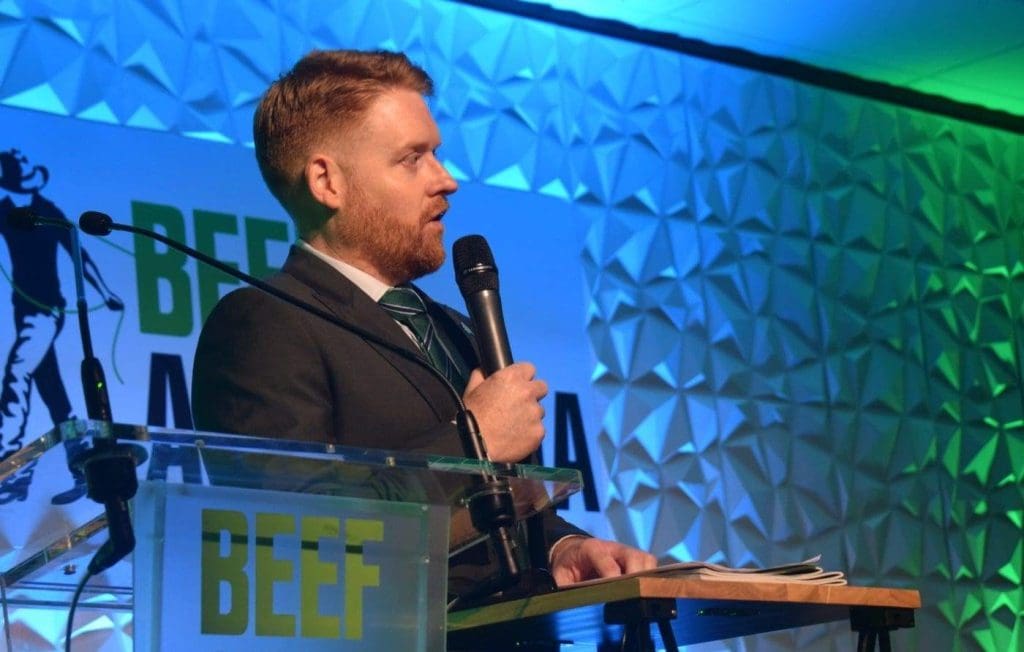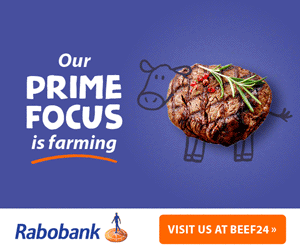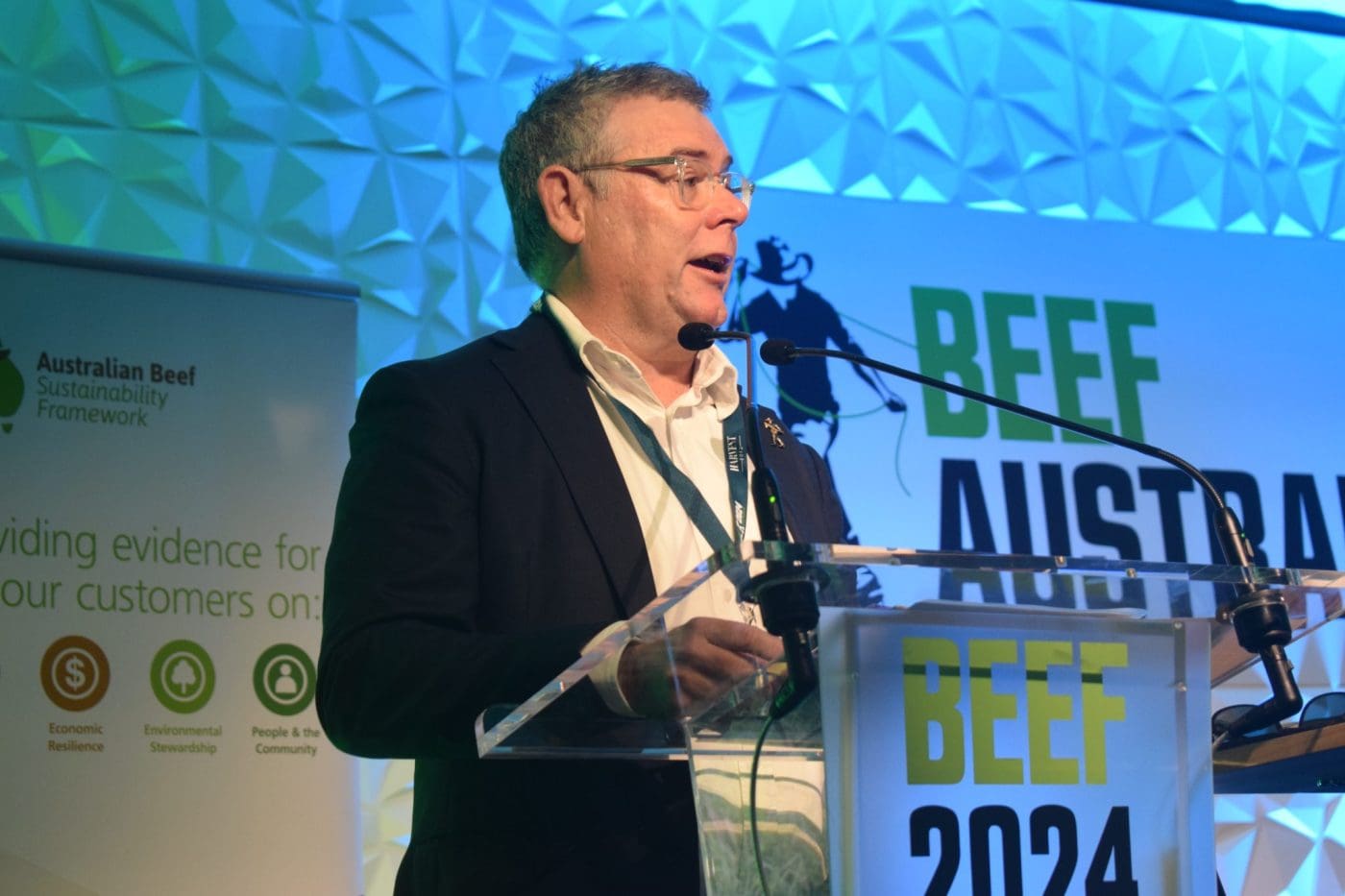
Sustainability Steering Committee chair Mark Davie
THE Australian Beef Sustainability Framework has today released its eighth annual update – with live export, carbon accounting and deforestation all on the agenda.
Stakeholders from across the supply chain gathered in Rockhampton this morning to discuss some of the finer points of the framework and its role in keeping the industry moving forward.
Sustainability Steering Committee chair Mark Davie launched the latest report, with an honest assessment of the direction of the framework and the data it will need going forward. He was followed by a fleeting speech from agriculture minister Murray Watt and a panel discussion with National Australia Bank, Teys and McDonald’s.
Beef Central went along and pulled out five key threads from the presentations.
Sustainability chair defends live export
With animal welfare being a part of the sustainability framework, Mr Davie was keen to point out the low mortality rates seen on live export boats – of 0.05pc. He said he was concerned that the sector was having trouble accessing finance on sustainability grounds.
“This rate is a testament to more than regulation, but to the implementation of processes by the industry every single day,” Mr Davie said.
“Our live export industry provides an enormous service to global food security and to animal welfare – we export animal welfare to the world.”
Mr Davie said he was concerned about banks taking positions against funding live export.
 “What are the sustainability grounds on this? they should have to demonstrate them against their financial services licenses. If you are interested in sustainability, this industry is continuing to put up the numbers,” he said.
“What are the sustainability grounds on this? they should have to demonstrate them against their financial services licenses. If you are interested in sustainability, this industry is continuing to put up the numbers,” he said.
“There are millions of children under five in south-east Asia that suffer from sever acute malnutrition and any impost on industry will be an impost on our customers and to their food security.”
Speaking to some members of the live export industry after the event, Beef Central asked if any work had been done to demonstrate the impact the live export industry has on its destination countries.
LiveCorp currently has a tender on its website to research the subject.
Murray Watt calls on EU to delay deforestation policy
Federal agriculture minister Murray Watt made a quick stop into the event and delivered a speech about the importance of the sustainability framework – particularly the environmental side of it.
“We have a lot of debates in this country and whether it is real,” he said.
 “No matter what you believe, you need to acknowledge that market is moving on this and if we want to have a competitive beef industry for generations to come we need to move with it.”
“No matter what you believe, you need to acknowledge that market is moving on this and if we want to have a competitive beef industry for generations to come we need to move with it.”
One of the big market movements coming on the environmental sustainability front, is legislation from the European Union to ban the import of goods linked to deforestation – including beef – by December.
Minister Watt said he had written to the EU outlining his concerns about the legislation and asked them to delay the rollout.
“We think that the way we produce beef in this country is significantly different to other countries that this legislation might be targeted towards,” he said.
“There is a lot of confusion from the Australian beef industry about what this rule will mean for the Australian beef industry. We think it is a sensible approach for the EU to delay this legislation and other countries in Europe have been making the same point.”
Producer pushes back on “hard to abate” rhetoric
In making his announcement, Minister Watt mentioned that agriculture was a “hard to abate” – meaning it is going to be hard for the industry to reduce its emissions.
Central Qld producer and Cattle Australia board member Adam Coffey stood up and asked for industry stop using the rhetoric.
“We even use it within industry and it is actually not a ‘hard to abate’ sector, it is a hard to quantify sector,” he said.
“We are prepared to lead this work and I would implore our supply chain partners to work with us because there is so much opportunity to get this right. In a global sense, we are actually on the cutting edge about our understanding of this issue.”
More work needed on emissions reporting metrics
On the reporting metrics, a key claim for the sustainability framework update was a 78pc net reduction in emissions between 2005 and 2021.
Mr Davie said while it was good news for the industry, there were some points to make about the figure.
“This an immensely positive numbers but it is also extremely complicated. It reflects a point in time where our landscape was responding after drought, the herd was increasing and our sequestration outweighed the increase in emissions by a lot,” he said.
“Importantly, our methodologies still cannot account for carbon sequestered in the soil and it still needs to be further evolved so we can fully report the beef industry’s story with emissions.
“Given our last measurement was in 2021, we need to work together to make a more accurate and timely measure of our carbon account.
“More importantly, we need more recognition of the role of carbon in agriculture and the role of the biogenic carbon cycle.”
Clear definitions needed for deforestation targets
Mr Davie has long been critical of other deforestation regulation being set by the European Union, raising concerns about definitions not being backed by credible peer reviewed science. This update he also raised concerns about the Science Based Targets initiative for company targets, which is bringing in similar deforestation policy.
“These requirements, which include definitions of forest height and canopy, do not relate to bioregions and they ignore extensive environmental research undertaken in an Australian context,” Mr Davie said.
“Nature preservation can and does go hand in hand with beef production. But sustainability intent must extend beyond corporate reporting to appease global standards or simply to achieve executive performance targets.
“The most important aspect of sustainability is outcomes.”
